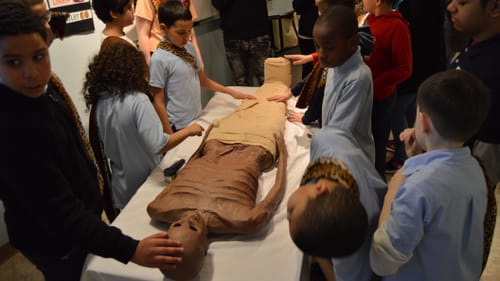Stay in the Loop
BSR publishes on a weekly schedule, with an email newsletter every Wednesday and Thursday morning. There’s no paywall, and subscribing is always free.
Museums open their doors a little wider
Philadelphia museums welcome visitors with disabilities

As a mom raising a son, now 14, who has autism and intellectual disabilities, I am keenly aware of how overwhelming many settings are for people like him. Autistic people may have sensory sensitivity to noise, visual stimuli, and busy crowds. While stadiums and loud concert venues are clear challenges, other settings, such as markets, restaurants, and museums—especially when crowded—can cause my son to experience a surge of “fight or flight” hormones that so distress him he needs to flee the scene.
But if a setting is calm, organized, quiet, and uncrowded, he loves being out in the community, experiencing all the music, arts, and culture Philadelphia has to offer. Fortunately, more arts and cultural institutions here and around the country are taking steps to make their environments more welcoming and supportive for people with autism and other disabilities. By offering accommodations in programs, supports, and physical design, museums are opening up to the one in five Americans—20 percent of the population—who have a disability.
Access at Philadelphia museums
In recent years, arts venues have woken up to the importance of providing supports for people with disabilities and their families. The Please Touch Museum, for example, offers “Play Without Boundaries,” in which the museum invites families inside before it opens to the public. This way, children with disabilities can avoid crowds and loud noises that may be challenging for them. The Franklin Institute and the Academy of Natural Sciences also host similar events.
The initiative I direct for Jewish Learning Venture, Whole Community Inclusion, partnered with the National Museum of American Jewish History. We created sensory-friendly access events at the museum, and calm, quiet spaces for tactile art projects, story times, and specially designed tours focused on experiencing the hands-on parts of the museum.

Beyond these special events, Art-Reach, a Philadelphia nonprofit whose mission is to “create, advocate for, and expand accessible opportunities in the arts so that the full spectrum of society is served,” has increased cultural opportunities for people with disabilities with its ACCESS admission program. People who have a Medical Access card for medical benefits receive $2 admission at 33 local cultural venues. For many families raising kids with disabilities, the extra expenses connected to their children’s medical and therapeutic care means there is no room in a family’s budget for nonessentials. ACCESS, funded in part by the National Endowment for the Arts, opens new worlds to these families.
Special education and the Penn Museum
At the Penn Museum, home to a renowned collection of art and artifacts from around the world, increased energy and attention to these issues allows for new visitors, including those with autism, intellectual disabilities, blindness, and mobility issues.
Most of the newly accessible programs were developed by Megan Becker, the museum’s first special-education-certified staff member. In August 2014, the Penn Museum received a grant to provide free programs to students in the Philadelphia school district. Schools began to sign up and Becker, who previously worked in the district in a classroom for students with emotional and behavioral disorders and learning disabilities, wondered why special-education teachers weren’t also signing up to bring their students.
Becker used her background with both museums and teaching to examine the district’s special education curriculum. She created programs highlighting student goals and integrated that learning into a Penn Museum experience. When the museum launched the new classroom programs for special education students in January 2015, 19 classrooms joined; in 2016, participation grew to 95 classrooms, and this year, by March, 85 classrooms had already signed up.

With the success of the classroom tours, Becker and the museum staff are now working to create programs designed for families raising children and teens with autism and intellectual disabilities. The museum held its first family evening expedition in February with 31 visitors. The two-hour program featured many of the same activities that are part of family programs, but with adaptations. For example, in one activity, participants learn to write hieroglyphs. Stamp pads and stencils were available for children and teens with fine motor challenges unable to write on their own. A quiet space with calming toys was available throughout the program.
The museum also created specially designed programs for blind or low-vision visitors. On Saturday, March 18, they presented “Tactile Trip Around The World,” in which visitors explored the museum’s galleries through touch and verbal description. The program featured touch experiences in eight of its galleries with staff stationed at each location to assist.
Physical accessibility
The Penn Museum opened in 1889 and, like many historical buildings, was built without any thought of access for people with mobility challenges. Fortunately, recent construction on a long-awaited ramp leading from the sidewalk to the museum’s elevated Warden Garden and Kamin Entrance now allows people in wheelchairs to access the museum through its front entrance.
While the Penn Museum has done an incredible amount of work putting programs in place, Becker feels they are at the beginning of a plan to fully include people with disabilities. “We’re making concentrated efforts to reach the needs of students who have multiple disabilities and whose teachers may not have found field trips that work for their classrooms yet,” she explains.
For my family—and families like mine—it is wonderful to have another Philadelphia cultural institution to visit, knowing that the supports are in place to make it a successful experience for us all.
Sign up for our newsletter
All of the week's new articles, all in one place. Sign up for the free weekly BSR newsletters, and don't miss a conversation.

 Gabrielle Kaplan-Mayer
Gabrielle Kaplan-Mayer